Howard Andrew Jones's Blog, page 43
July 8, 2015
Review Copies
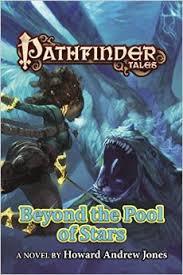 I have a limited number of review copies of my next novel, Beyond the Pool of Stars, available. If you’re a book reviewer and are interested in obtaining a copy, let me know!
I have a limited number of review copies of my next novel, Beyond the Pool of Stars, available. If you’re a book reviewer and are interested in obtaining a copy, let me know!
Here’s the cover blurb:
Mirian Raas comes from a long line of salvagers, adventurers who use magic to dive for sunken ships off the coast of tropical Sargava. When her father dies, Mirian has to take over his last job: a dangerous expedition into deep jungle pools, helping a tribe of lizardfolk reclaim the lost treasures of their people. Yet this isn’t any ordinary job, as the same colonial government that looks down on Mirian for her half-native heritage has an interest in the treasure, and the survival of the entire nation may depend on the outcome…
Keep in mind that these are uncorrected proofs, so there may be some material in them that won’t appear in the final draft (these aren’t likely to be bonus scenes, but creative spelling, typos, and the like).
Drop me a line at jones howard at twc dot com (with no spaces) if you want to get your hands on one!
July 3, 2015
Swords In the Mist Re-Read: “The Wrong Branch”
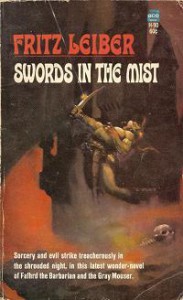 Bill Ward and I are continuing our read through of Fritz Leiber’s collection of Fafhrd and Gray Mouser stories, Swords in the Mist. This week we’re looking at the fifth tale in the collection, “The Wrong Branch.”
Bill Ward and I are continuing our read through of Fritz Leiber’s collection of Fafhrd and Gray Mouser stories, Swords in the Mist. This week we’re looking at the fifth tale in the collection, “The Wrong Branch.”
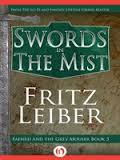 Howard: I’m starting to remember why I never liked this book quite as well as Swords Against Death. The actual stories in it are quite strong, but there is a lot of filler. Satisfying adventure to page ratio is much higher in Swords Against Death than it is in any of my other favorite volumes (that includes this one, Swords Against Wizardry, which has two novellas and a couple of linking tales, and The Swords of Lankhmar, which is two novelettes stitched together into a continuous narrative.
Howard: I’m starting to remember why I never liked this book quite as well as Swords Against Death. The actual stories in it are quite strong, but there is a lot of filler. Satisfying adventure to page ratio is much higher in Swords Against Death than it is in any of my other favorite volumes (that includes this one, Swords Against Wizardry, which has two novellas and a couple of linking tales, and The Swords of Lankhmar, which is two novelettes stitched together into a continuous narrative.
And of course we have “Adept’s Gambit” looming before us, one I never liked well enough to re-read. I suppose I’ll see why here very soon.
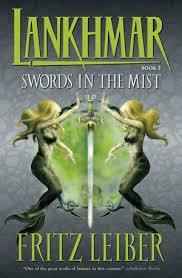 Bill: I think the best way to approach “Adept’s Gambit” is how we see the Twain themselves approach their upcoming journey in “The Wrong Branch:” don’t worry so much about the things that don’t make sense, just enjoy it as another adventure.
Bill: I think the best way to approach “Adept’s Gambit” is how we see the Twain themselves approach their upcoming journey in “The Wrong Branch:” don’t worry so much about the things that don’t make sense, just enjoy it as another adventure.
Howard: I’ll try to do that. As to “The Wrong Branch,” it’s even more of a linking tale than anything else in here. It’s charming because it’s crafted with love for the characters. It doesn’t really tell a tale, and I think, were this a novel, it would just be a couple of pages happening while the characters are on their way from here to there.
Bill: It’s fun and light-hearted, and does a good enough job introducing the very odd change in setting by having a few historical terms intrude into the fantasy setting.

Jonquil & Fritz Leiber.
Howard: I wonder if Leiber actually meant, one day, to take Fafhrd and the Mouser to some other world or time via this method, or if this little segue through the wrong branch was just a way to include this early tale written about them set in this particular historical period of Earth.
Of course, it turns out that they didn’t actually take the wrong branch, since Ningauble seems to have planned for them to go that way…
Bill: I had always assumed Leiber had intended more Earth adventures when I read it the for first time. Seemed like a lot of trouble to go through just to move them for one story. Of course, at that time I didn’t know “Adept’s Gambit” was the first Fafhrd and Gray Mouser story, and that Lankhmar only came along afterwards. I’m guessing most of us resented “Gambit’s” setting change going into it, but that’s something to talk about next week.
July 1, 2015
Writing Mistakes 3
 As regular visitors know, I keep a regular list of writing tips in the front of my notebook. Or, as I more often think of them, my writing mistakes (discussed here and here), because usually I only get the tip after I’ve made the mistake. I write down the solution in my notebook in the hope that looking at that list makes it more likely I won’t make the mistake.
As regular visitors know, I keep a regular list of writing tips in the front of my notebook. Or, as I more often think of them, my writing mistakes (discussed here and here), because usually I only get the tip after I’ve made the mistake. I write down the solution in my notebook in the hope that looking at that list makes it more likely I won’t make the mistake.
 Unfortunately I do tend to repeat mistakes. That said, I definitely feel like reviewing this list helps my writing process, because it means I keep previous mistakes in mind.
Unfortunately I do tend to repeat mistakes. That said, I definitely feel like reviewing this list helps my writing process, because it means I keep previous mistakes in mind.
Next week I’ll write a little about one important lesson I’ve re-learned. Today I just wanted to mention a shorter one I thought worth considering, and that’s that a plot isn’t necessarily made interesting by combat — that sometimes the adventure is the unfolding of discovery. Often that’s the unveiling of a mystery or secret, but sometimes, as it so often is in historicals, it’s seeing the character mature and learn how the world works. She’s met the man of his dreams, but how will they get together? Or he’s going to spend the summer with his grandparents; how will that change him?
In condensed form, suitable to fit on my list, I’ve described that as “Plot unfolding through discovery can be just as exciting as plot through action.” Of course, it has to be handled properly, or it will be dull as dirt, or overwrought, or have any other number of problems. My note is just a reminder that the story doesn’t have to be one hack fest followed by another.
June 30, 2015
The Lion of Lucca
 I just finished the second Gardner Fox historical novel after loving The Borgia Blade. This one, The Lion of Lucca, didn’t thrill me nearly as much. Any time that there were tactics or battle scenes, it was great stuff. The rest of the time I was reading a romance novel from a guy’s perceptive, which meant that there wasn’t much about what anyone was feeling, just a whole lot of admittedly well-written descriptions of lovely renaissance women getting it on with the protagonist.
I just finished the second Gardner Fox historical novel after loving The Borgia Blade. This one, The Lion of Lucca, didn’t thrill me nearly as much. Any time that there were tactics or battle scenes, it was great stuff. The rest of the time I was reading a romance novel from a guy’s perceptive, which meant that there wasn’t much about what anyone was feeling, just a whole lot of admittedly well-written descriptions of lovely renaissance women getting it on with the protagonist.
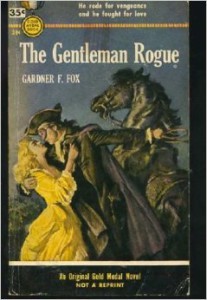 I kept at the book, although the fact that it was pretty short and it took me at least a week and a half to read should probably red flag you that I had to take it in small doses. I felt was like watching a movie made by two different directors and spliced together. You know, soft core porn guy alternated with clever historical re-enactment guy.
I kept at the book, although the fact that it was pretty short and it took me at least a week and a half to read should probably red flag you that I had to take it in small doses. I felt was like watching a movie made by two different directors and spliced together. You know, soft core porn guy alternated with clever historical re-enactment guy.
It was just a little odd. There were some racy scenes in The Borgia Blade, but they meshed much more smoothly with the plot, and I cared more when they happened because I cared more about the characters.
Anyway, as a result, I’m less enthusiastic about exploring the rest of Gardner Fox’s historical novels, although I’ll probably give him another go eventually. I mentioned how pleased I was with The Borgia Blade the other day and Chris Hocking pointed out that it had first been published by Gold Medal, then waxed eloquent about the excellence of their editorial team, and how he’d never actually read a bad Gold Medal book. Some were just fair, sure, but he said most in his experience were good to excellent. Perhaps that famed editorial team brought out the best in Fox’s first book.
I’ve just now performed a cursory search and found that there are, indeed, several more Gold Medal books by Fox. Maybe I’ll try those if I can land them for decent prices. My birthday’s coming up next month, after all.
June 26, 2015
Swords in the Mist Re-Read: “When the Sea-King’s Away”
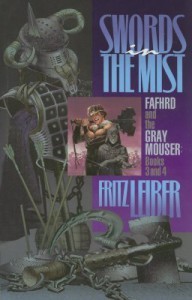 Bill Ward and I are continuing our read through of Fritz Leiber’s collection of Fafhrd and Gray Mouser stories, Swords in the Mist. This week we’re looking at the fourth tale in the collection, “When the Sea-King’s Away.”
Bill Ward and I are continuing our read through of Fritz Leiber’s collection of Fafhrd and Gray Mouser stories, Swords in the Mist. This week we’re looking at the fourth tale in the collection, “When the Sea-King’s Away.”
 Howard: It’s astonishing to me that a tale can evoke such wonder and delight and remain so simple. I mean “simple” as in plot structure, because “When the Sea-King’s Away” is ornamented with wonderful descriptions, moments of humor and character and even suspense — although I have to say that the battles are foregone conclusions and seem almost afterthoughts. (They’re nonetheless entertaining.)
Howard: It’s astonishing to me that a tale can evoke such wonder and delight and remain so simple. I mean “simple” as in plot structure, because “When the Sea-King’s Away” is ornamented with wonderful descriptions, moments of humor and character and even suspense — although I have to say that the battles are foregone conclusions and seem almost afterthoughts. (They’re nonetheless entertaining.)
Bill: It’s an extremely impressive and compelling tale, meticulously imagined. The detailed descriptions of the water funnel, for example, went beyond scene setting purposes or simple wonderment to create real tension. And the tension of course created suspense, but it also created some of the funniest scenes in the series. Everything Leiber does here serves multiple purposes in the story, and its those elements that really take over from the plot, simple as it is. I also think the fight scene was wisely stripped down to its essence (as well as being clever). I think anything more involved would have felt a little out of place.
 Howard: And then it’s stuffed full with all kinds of great quotes. Like this one, when the Mouser has to decide whether to follow the recklessly cheerful Fafhrd: “The Mouser sighed. The moment had come, he knew, as it always did, when outward circumstances and inner urea commanded an act, when curiosity and fascination tipped the scale of caution, when the lure of a vision and an adventure became so great and deep-hooking that he must respond to it or have his inmost self-respect eaten away.”
Howard: And then it’s stuffed full with all kinds of great quotes. Like this one, when the Mouser has to decide whether to follow the recklessly cheerful Fafhrd: “The Mouser sighed. The moment had come, he knew, as it always did, when outward circumstances and inner urea commanded an act, when curiosity and fascination tipped the scale of caution, when the lure of a vision and an adventure became so great and deep-hooking that he must respond to it or have his inmost self-respect eaten away.”
Bill: That’s beautiful — in one stroke Leiber presents us with a plausible adventuring mentality. And I think that quote comes on the heels of one of my favorite bits, when the Gray One decides the impossible hole in the Ocean he’s looking at must be real, because Fafhrd, being “much too huge a hulk of solid matter to be picturable as strolling arm-in-arm with illusions.”
 Howard: As long as we’re quoting, I have to make mention of one of my very favorite Leiber observations, right after Fafhrd comments that there must be magic afoot: “The Mouser thought he had never in his life heard a less necessary remark.” Indeed. The entire 6-8 pages (depending upon your edition) of preceding text has been pretty much nothing BUT descriptions of this fantastic, impossible place, and then Fafhrd says that. The Mouser’s internal thought is laugh out loud funny.
Howard: As long as we’re quoting, I have to make mention of one of my very favorite Leiber observations, right after Fafhrd comments that there must be magic afoot: “The Mouser thought he had never in his life heard a less necessary remark.” Indeed. The entire 6-8 pages (depending upon your edition) of preceding text has been pretty much nothing BUT descriptions of this fantastic, impossible place, and then Fafhrd says that. The Mouser’s internal thought is laugh out loud funny.
Bill: And it manages to be laugh out loud funny in the midst of some nail biting description. The water wall is actually pretty terrifying as it is presented, and the Mouser’s reservations (and frustrations in dealing with an oblivious loon who douses a torch in the ceiling of their tiny pocket of air deep beneath the waves) are perfectly understandable.
Howard: At this point, Leiber’s prose is so sure-footed he brings this very simple idea — what if Fafhrd and the Mouser went courting some mer-women — into an entertaining and colorful adventure. Another high point in their saga, methinks.
Bill: I agree, I think this story is nothing short of brilliant, one of my new favorites.
Howard: Next week we’ll look at the brief linking story, “The Wrong Branch,” and then it’s on to “Adept’s Gambit.” If you’ve been following the comments section in our last post, you know that we’re a little leery about what we’ll find when we get to that final story…
June 24, 2015
The Perfect Pocket Writing Notebook: Review 6
 This week I’m taking a look at the Pen & Ink Lined Journal. If you’re interested in seeing other reviews, or finding out what my judging criteria are (including what standard features I prefer) click here.
This week I’m taking a look at the Pen & Ink Lined Journal. If you’re interested in seeing other reviews, or finding out what my judging criteria are (including what standard features I prefer) click here.
Pricing: $6.96 and up
Like my previous reviews of Picadilly and Poppin notebooks, the Pen & Ink is one of the least expensive brands on my “best of list.” When I showed the initial notebooks I was going to review to my teenagers the Pen & Ink made it into the top three on both of their lists, over several more expensive brands (in case you’re curious, they both liked the Poppin best).
 This little hardback is durable, lays flat, and is well bound. What you won’t be able to tell from any pictures is that it has a similar feel to the Rhodia, with a little flex and a little give so that it’s a tactile pleasure to hold. It doesn’t feel quite as nice as the Rhodia, but as my children remarked, it doesn’t have the brand name emblazoned on the cover either. In fairness to the Rhodia I should add — without meaning to knock the Pen & Ink, which is well made — that the Rhodia has better binding and paper. But then the Rhodia’s usually at least three times as expensive as the Pen & Ink.
This little hardback is durable, lays flat, and is well bound. What you won’t be able to tell from any pictures is that it has a similar feel to the Rhodia, with a little flex and a little give so that it’s a tactile pleasure to hold. It doesn’t feel quite as nice as the Rhodia, but as my children remarked, it doesn’t have the brand name emblazoned on the cover either. In fairness to the Rhodia I should add — without meaning to knock the Pen & Ink, which is well made — that the Rhodia has better binding and paper. But then the Rhodia’s usually at least three times as expensive as the Pen & Ink.
There are no frills apart from the standard — bookmark, elastic closure, inside back cover envelope — so that if you’re wanting page numbers or even a dedicated place to write your name, you’re out of luck. It does have a distinctive look to its lines which my kids and I both like. (If you prefer softer lines, this may not be the notebook for you.)
 I like to create headers when I change subjects in my writing notebooks so things are easy to find later. Space for that is a little cramped in the Pen & Ink, but I honestly love the darkness of the lines.
I like to create headers when I change subjects in my writing notebooks so things are easy to find later. Space for that is a little cramped in the Pen & Ink, but I honestly love the darkness of the lines.
Like the Rhodia and the Picadilly, the cover is easily marred by the elastic closure strap, something you may or may not like. (I don’t mind.)
There’s something in total about this particular model that makes it especially inviting, a combination of its features that gives it a charm that’s hard to articulate.
The Pen & Ink doesn’t seem that widely available, unless you count Amazon, which means you can lay hands on it pretty readily. It only comes in black, and it’s only available in hardcover. Read the fine print so you don’t accidentally order a graphed or unlined version — the lined versions, though, do seem to have a blue cover wrap.
June 22, 2015
Beyond the Pool of Stars
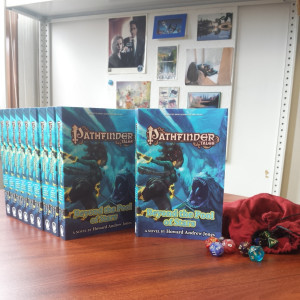 I spotted this the other day. A whole slew of copies of my new book ready to be released. Not to the general public yet, alas, but to reviewers. These are advanced reading copies, or ARCs. It won’t be on bookstore shelves until the fall.
I spotted this the other day. A whole slew of copies of my new book ready to be released. Not to the general public yet, alas, but to reviewers. These are advanced reading copies, or ARCs. It won’t be on bookstore shelves until the fall.
It’s so nice to have a new book just about ready to appear in print!
I’m preparing to dive back into another pass on its sequel at the same time I’m performing rather intense revisions on my new series for Thomas Dunne Books/St. Martin’s. Much as I love the temporary title I’ve been using, I’m not sure it really works anymore, at least for the first book in the sequence.  In other news, I finally watched the last two episodes of the Daredevil TV show. I found the writing of very high caliber almost all of the time, and the acting was definitely top notch. It was just an all-around extremely well-executed product. I wish one important arc in the next to last episode didn’t resolve in one character’s death, a moment that seemed almost stereotypical, but what are you going to do. Also, the violence was so pronounced my wife had a hard time watching it with me. Her job can be a little traumatic, so she understandably doesn’t like to see trauma enacted on the screen, which is the chief reason I’ve never shown her Justified, my personal pick for the best written show on television in the last decade or so.
In other news, I finally watched the last two episodes of the Daredevil TV show. I found the writing of very high caliber almost all of the time, and the acting was definitely top notch. It was just an all-around extremely well-executed product. I wish one important arc in the next to last episode didn’t resolve in one character’s death, a moment that seemed almost stereotypical, but what are you going to do. Also, the violence was so pronounced my wife had a hard time watching it with me. Her job can be a little traumatic, so she understandably doesn’t like to see trauma enacted on the screen, which is the chief reason I’ve never shown her Justified, my personal pick for the best written show on television in the last decade or so.
The family and I have returned from London and Paris and there are some interesting stories to tell about our times, but I’ll wait until I have ready access to the photos. I still haven’t seen the new Mad Max, or several other new movies that are garnering strong reviews. I suppose the one that interests me the most is Inside Out, although I hear both from my in-laws and Lou Anders that Spy is surprisingly funny, so maybe it’s worth a look… although a rental will probably serve.
 We started watching I, Claudius with my oldest teenager the other day while youngest teenager is away at summer camp. She’s a little too young for it yet. I haven’t seen it in decades, so it will be interesting to see how it holds up. My copy comes courtesy of E.E. Knight, who passed on his to mine when he upgraded to Blu-Ray.
We started watching I, Claudius with my oldest teenager the other day while youngest teenager is away at summer camp. She’s a little too young for it yet. I haven’t seen it in decades, so it will be interesting to see how it holds up. My copy comes courtesy of E.E. Knight, who passed on his to mine when he upgraded to Blu-Ray.
That’s really about it. It was wonderful to be able to take the kids to Europe. Now I’m back to the usual things — paying bills, figuring out which things in the house need to be fixed first, getting child 1 ready for college (well, the college part is new!), writing. A lot of people think this writing thing is glamorous, but mostly I’m just sitting in front of a glowing screen typing, or staring off into space in between typing, or doing house chores. I’ll tell you what, though, I know how lucky I am to be able to do this for a living.
June 19, 2015
Swords in the Mist Re-Read: “Their Mistress, The Sea”
 Bill Ward and I are continuing our read through of Fritz Leiber’s collection of Fafhrd and Gray Mouser stories, Swords in the Mist. This week we’re looking at the second tale in the collection, “Lean Times in Lankhmar.”
Bill Ward and I are continuing our read through of Fritz Leiber’s collection of Fafhrd and Gray Mouser stories, Swords in the Mist. This week we’re looking at the second tale in the collection, “Lean Times in Lankhmar.”
Howard: “Their Mistress, the Sea” can’t properly be called a linking story — it’s more like a linking interlude, an explanation as to what happened between the preceding story and the one that follows. Yet it’s not without some charm. Leiber clearly loved this world and his characters, and it shows in many of the small details.
 Bill: The metaphysical musings and arguments, the different ways the two got back into adventuring shape, and the rather considerate nature of their piracy were the standout moments for me.
Bill: The metaphysical musings and arguments, the different ways the two got back into adventuring shape, and the rather considerate nature of their piracy were the standout moments for me.
Howard: Those were the moments that I remembered best myself. Short as this tale is, it doesn’t outstay its welcome, which can’t be said of all of Leiber’s linking efforts. We’re treated to mentions of the pair’s services for the Mad Duke (never depicted by Leiber) and the white-furred giant worm. We also witness the departure of Ourph the Mingol. I remembered him as a recurring character, and I can’t recall if he turns up in later stories or not. I kind of hope that he does.
Bill: As do I, but I can’t recall if he ever does or not. And, as much of an interlude as this is, and as little really as there is to prompt discussion when compared to any of the stories proper, Leiber is still Leiber; take this wonderfully written paragraph near the end of the piece for example:
But chiefly they talked of their mistress, the sea, whose curving motions they loved again, and to whose moods they now felt preternaturally attuned, particularly in darkness. They spoke of her rages and caresses, her coolths and unending dancings, sometimes lightly footing a minuet, sometimes furiously a-stamp, and her infinitude of secret parts.
 They go from miserable and sea-sick, weak from civilized life, back to their true, adventuring selves. It’s great stuff, it’s what they’re all about as characters.
They go from miserable and sea-sick, weak from civilized life, back to their true, adventuring selves. It’s great stuff, it’s what they’re all about as characters.
Howard: Leiber seems to have an affinity for the ocean and sea travel and always brings it brilliantly to life.
Next week we’ll see “When the Sea-King’s Away,” the last tale in this particular volume I remember reading with any great pleasure. I hope that my memory’s simply faulty and that “Adept’s Gambit” proves stronger than I recall.
Bill: I’m apprehensive of “Adept’s Gambit” as well. Reading a little background on it should hopefully improve my perspective on it this time around.
June 17, 2015
The Perfect Pocket Writing Notebook: Review 5
 This week I’m reviewing the Palamino Luxury Small hardcover. If you’re interested in seeing other notebook reviews, or my judging criteria, click here. Unless noted otherwise, all the notebooks I review are 3.5 by 5.5 — other details I expect include an elastic closure, a bookmark, and an inside back cover envelope (again, follow the link for details).
This week I’m reviewing the Palamino Luxury Small hardcover. If you’re interested in seeing other notebook reviews, or my judging criteria, click here. Unless noted otherwise, all the notebooks I review are 3.5 by 5.5 — other details I expect include an elastic closure, a bookmark, and an inside back cover envelope (again, follow the link for details).
Pricing: $12.95 and up
 The Palamino Luxury has such a unique look that you’ll either love it or hate it. I personally think it’s pretty snazzy. It’s also got a neat feature concerning the elastic closure. Most other pocket notebooks that I’ve seen are engineered so that the elastic strap dangles once you open them, but the Palamino’s lies flat in the back when you’re not using it, as shown to the right.
The Palamino Luxury has such a unique look that you’ll either love it or hate it. I personally think it’s pretty snazzy. It’s also got a neat feature concerning the elastic closure. Most other pocket notebooks that I’ve seen are engineered so that the elastic strap dangles once you open them, but the Palamino’s lies flat in the back when you’re not using it, as shown to the right.
 Certainly that feature with the closure isn’t any kind of make or break deal, but it shows that more than a little thought went into the notebook’s construction.
Certainly that feature with the closure isn’t any kind of make or break deal, but it shows that more than a little thought went into the notebook’s construction.
It’s well bound and durable and lays flat. The interior pages have a little extra room up at the top, enough so that you can create page headers to help you organize if you like but not enough that there’s much wasted space. It’s just right for my needs.
The inside front cover and facing page have dedicated space for you to write your name and contact information.

The Palamino’s binding.
It’s a solid little hardback with very little flex, so you’ll definitely notice if you forget it’s in your back pocket when you take a seat.
I’ve made sure to point out brands where the closure leaves a permanent mark once it’s used a few times so I should mention that the Palamino, like the hardback Leuchtturm1917, is so well constructed the elastic closure doesn’t damage the cover.
With its striking design and excellent manufacture, it’s another fine choice for the writer on the move. It can be found through many online venues.
June 15, 2015
The Borgia Blade
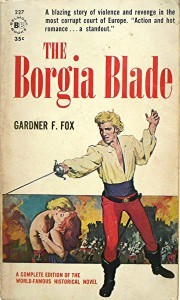 I know of Gardner Fox mostly through his comic creations (like, say Hawkman or the Justice Society of America) and the sword-and-sorcery adventures of Kothar. The Kothar stories are mild entertainment. They alternate moments of splendid action and inventiveness with head-slapping stupidity and nonsense. I once resolved to finally read through the entire series — they’re short books, after all — and mid way through the second book remembered why I hadn’t gotten any further.
I know of Gardner Fox mostly through his comic creations (like, say Hawkman or the Justice Society of America) and the sword-and-sorcery adventures of Kothar. The Kothar stories are mild entertainment. They alternate moments of splendid action and inventiveness with head-slapping stupidity and nonsense. I once resolved to finally read through the entire series — they’re short books, after all — and mid way through the second book remembered why I hadn’t gotten any further.
But Morgan Holmes knows his heroic fiction, and when he told me there were some good Gardner Fox historicals, I believed him implicitly, and snapped up the three he said were the best. One of these, The Borgia Blade, I took with me to read on a long plane flight recently, and the competence of the writing and the depth of the characters surpassed anything that I’d expected from the creator of Kothar.
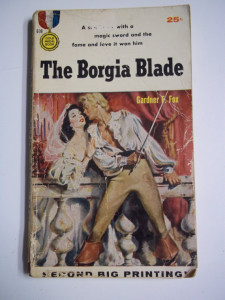 I’m better read on Renaissance Italy than your average man, but I’m no expert. Fox clearly was — he breathed so much life into every moment I thought I was in Italy myself. And he sure seemed to know sword fighting, and human nature, not to mention how to lay down a cracking good tale. Sure, it’s not a MODERN tale, but it’s a grand old fashioned historical adventure with a lot more verve and gusto than far more famous ’50s historicals. As I think I’ve mentioned, someone unfamiliar with ’50s historical adventure novels might think they’ve stumbled upon a treasure trove when they chance upon their back cover copies, but most are rather slow and labored. There are some gems, and I heartily declare that The Borgia Blade is one of them.
I’m better read on Renaissance Italy than your average man, but I’m no expert. Fox clearly was — he breathed so much life into every moment I thought I was in Italy myself. And he sure seemed to know sword fighting, and human nature, not to mention how to lay down a cracking good tale. Sure, it’s not a MODERN tale, but it’s a grand old fashioned historical adventure with a lot more verve and gusto than far more famous ’50s historicals. As I think I’ve mentioned, someone unfamiliar with ’50s historical adventure novels might think they’ve stumbled upon a treasure trove when they chance upon their back cover copies, but most are rather slow and labored. There are some gems, and I heartily declare that The Borgia Blade is one of them.
It’s long out of print, of course, but it’s not too expensive to lay hands on a copy if you want to look for it through addall.com or some other used book search service. Highly recommended for those readers who love an action adventure with swashbuckling sword-play, intrigue, lovely women, and Leonardo DaVinci.
Howard Andrew Jones's Blog
- Howard Andrew Jones's profile
- 368 followers



